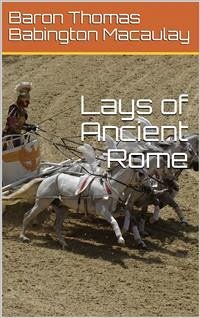Lays of Ancient Rome is a collection of narrative poems, or lays, by Thomas Babington Macaulay. Four of these recount heroic episodes from early Roman history with strong dramatic and tragic themes, giving the collection its name. Macaulay also included two poems inspired by recent history: Ivry (1824) and The Armada (1832). The Lays were composed by Macaulay in his thirties, during his spare time while he was the "legal member" of the Governor-General of India's Supreme Council from 1834 to 1838. The Roman ballads are preceded by brief introductions, discussing the legends from a scholarly perspective. Macaulay explains that his intention was to write poems resembling those that might have been sung in ancient times. The Lays were first published by Longman in 1842, at the beginning of the Victorian Era. They became immensely popular, and were a regular subject of recitation, then a common pastime. The Lays were standard reading in British public schools for more than a century. Winston Churchill memorised them while at Harrow School, in order to show that he was capable of mental prodigies, notwithstanding his lacklustre academic performance. It's a very Victorian collection of poetry: there is more blood, honor, guts, and glory in a sterner, straighter telling than you would get from a modern author. At the same time, there are entire stanzas that just give you a view of the countryside -- nothing else. And the stories are unforgettable.


